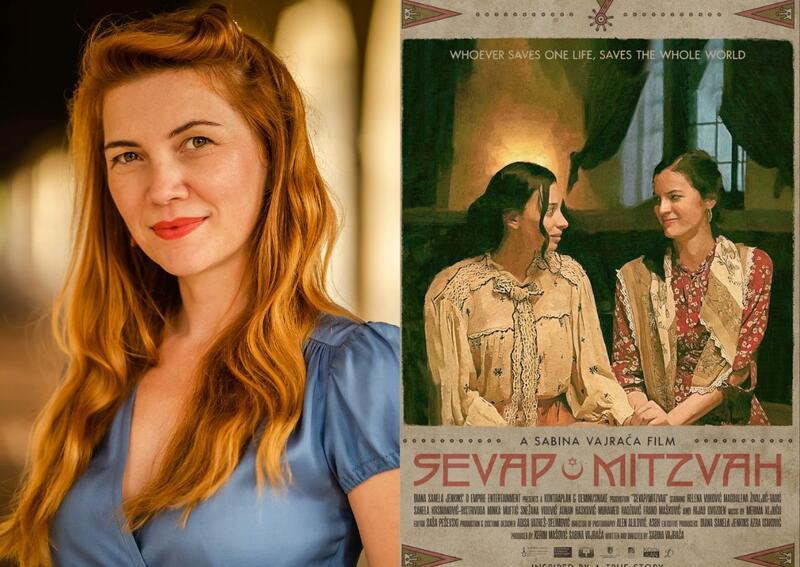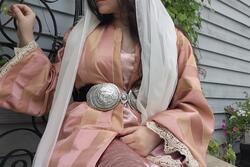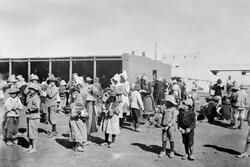Q & A with Sabina Vajraca about her New Film, "Sevap/Mitzvah"
Sevap/Mitzvah is inspired by the powerful true story of two women who become one another’s salvation.
In the 1940s, the Ustasha (Croatian fascist forces) begin gathering Jews for deportation in Bosnia. Muslim Zejneba (ZEY-ne-ba) Hardaga spots her Jewish childhood friend, Rifka Kabiljo (ka-BEE-leeoh), in public. She uses her hijab to hide the armband that indicates Rifka’s Jewish identity, and proceeds to hide Rifka and the Kabiljo family in the Hardaga house.
Fifty years later, as the 1992 Bosnian genocide starts to unfold, Rifka transports Zejneba and the Hardaga family to Jerusalem. Hardaga’s granddaughter still lives in Jerusalem today and has converted to Judaism.
Bosnian director Sabina Vajraca brought this incredible story to life with her short film, Sevap/Mitzvah. In Judaism, a mitzvah is a commandment given by God. Sevap is the Balkan spelling of thawab, the Arabic word for a good deed or for the reward that comes with a good deed. Etymologically related to the Hebrew word teshuvah (literally “returning”), the word sevap connotes a reward or return. Sevap/Mitzvah is about what we owe one another and what our deeds will return over time, whether good or bad. I sat down with director Sabina Vajraca to talk about the film.
JWA: How did you discover the story that inspired Sevap/Mitzvah? What drew you to this story?
Sabina Vajraca: My dad’s mom told me stories. She’s the first person in my family who brought up that Muslims saved Jews during World War II. She brought it up shortly before she passed, talking about the one thing she still regrets to this day. She told me of her friend who she grew up with in her hometown, in the same neighborhood. She was nine or ten when the Ustasha took over and took her friend’s family away. My grandma was crying, trying to figure out what was happening, because no one knew what was going on. Her family didn’t want to get involved. She assumes her friend was killed in a concentration camp. She said, “Fifty years later, they came for us. Maybe if we had done something back then, we wouldn’t have been taken to camps all those years later.”
In 2021, there was a situation with Israelis and Palestinians—right now it’s not a situation, it’s just horrific. Back in [the] 2021 [Israeli–Palestinian crisis], the US media was talking constantly about this hatred between Muslims and Jews and how they have always hated each other and there was no way for them to coexist. I get very tired of these [stories]. They remind me of how Serbs, Croats, and Bosnians were told we couldn’t live together. I figured there are probably stories of Muslims and Jews [in Palestine/Israel] being friends and neighbors together. I wanted to show Muslims and Jews being friends and helping one another. I thought, let me find a story of Muslims saving Jews during World War II. I read all of these stories—one of the first ones was Zejneba and Rifka. How appropriate it is considering my grandmother’s story. If she had been the same age as Zejneba, she would have been able to do the same thing.
JWA: What was the filming process like and where did you film?
SV: I filmed everything in Bosnia and I did everything in Bosnia, from production to post. I felt that this was such a uniquely Bosnian story that I felt people in Bosnia needed to be reminded of it. Since the war, Bosnia has become segregated and divided. I wanted to bring out that part of history none of us knew about, and bring it back home. In Sarajevo, I worked with a Bosnian cast and crew. Even my poster was created by Ideologia, a company in Sarajevo.
JWA: How has the film been received by the communities that it is about, Bosnian Muslims and Jews?
SV: Very well! I am very happy about that. Especially the Bosnian Jewish community—which is very small now in Sarajevo—wholeheartedly embraced the film. They were very helpful in the making of it, and it was important to be respectful and authentic. We had an advisor on the set who was very helpful. We showed the film multiple times to different communities, and that means a lot to me. There’s nothing worse than telling the story of a community you’re not from and them telling you, “You kind of screwed this up!” And then the Muslim community has been very receptive. What’s happening now, I’m really grateful for. A lot of organizations that are focused on interfaith dialogue are contacting me to show the film to their communities. I think this is important in today’s climate, which is teaching us other ideas.
JWA: Sevap/Mitzvah is rich with imagery that is very evocative and nostalgic for a Balkan viewer. What is a small detail that a Balkan viewer might notice, but a non-Balkan viewer might not, that you feel love for and want to point out?
SV: The scene where Zejneba brings coffee to her husband and his brother. In America, coffee is a drug! You need it in the morning. In Bosnia, coffee is a mindful ritual. We have five or six different coffees throughout the day. We call it Bosnian coffee, but it’s Turkish coffee. It’s something you sip, it’s something you share, it’s a moment of connection. Zejneba won’t be invited into the room with these men, but she figures, if I bring coffee I will be allowed to enter, and I can perhaps, using the coffee, say what I need to say.
JWA: As Balkan feminists, we are acutely aware that we are from a place in which we are taught to have competing histories, authenticities, and myths. For example, concerns about territorial claims manifest in Serbian nationalist propaganda about Bosnians and Muslim Albanians being Turkic invaders, instead of understanding all populations as belonging to the peninsula. Which parts of the film speak to this tension?
SV: When it comes to places like the Balkans that have seen a lot of conflict, a lot of war over many centuries and many different generations, we all have such deep intergenerational trauma. Even if we have not ourselves experienced something like that, it trickles through genetics, or by stories taught to us by our parents or grandparents. My upbringing up until the Bosnian War [of 1992-1995], those weren’t the narratives I was fed. At least in Bosnia, the Yugoslavian principles of brotherhood and unity were really prevalent. I think I still hold onto those ideas, that philosophy that we are all somehow able to be the same, we can coexist, be together.
When I was making this film, that part of the story really resonated with me. These two groups weren’t at each other’s throats—but you didn’t have to help each other, either. I know there are people in my family that would have looked the other way. My mom and dad taught me that to be a good person means you do what’s right — it doesn't matter how much it affects your own existence. There were a lot of Serbs that, when the atrocities were happening, they looked the other way. Today, they tell their kids that nothing ever happened. They don’t want their children to know that when their neighbors were being killed…well, no one wants to be a bad guy in their story.
For me as a survivor of that, someone I believe would put her neck on the line, it was hard to understand people that wouldn’t. I learned through my own healing to acknowledge everyone’s different function. In the film, Izet, Mustafa’s brother, and his wife Bahia—they’re not necessarily bad people, but they’re functioning how most people would function in this situation. “This has nothing to do with us, why are you getting involved, you’re going to get us killed for ideas and principles that have nothing to do with everyday life.” This is my way to put out into the world that it’s okay if that’s initially you—your survival instinct being stronger than your altruism. But we can put the benefit of our world and humanity at large, first and foremost.
JWA: Do you have future plans for the film?
SV: I’ve wanted to turn it into a feature-length film from the beginning. My goal for the short is to show it as a proof of concept. I didn’t have enough money to make a feature. Currently we are expanding the script and we’re going to do fundraising to try to make it in 2025 or 2026.
JWA: What do you hope that different viewers take from the film—Jewish, Balkan, non-Jewish, none of the above?
SV: We finished it at the beginning of 2023. People would watch it and ask how it is relevant to today. Why now? My belief is, wars keep happening. Sure, this particular story is about Muslims and Jews, but even in America, there's such animosity, open animosity across the political spectrum and within it. I think this film teaches us that it is possible to look beyond the labels others put on us and tap into the humanity we all have within. We are looking at the current situation in Israel and Gaza—I hope there are people over there willing to help one another simply because the other person is human. A child wants to live and be happy and play with their friends and cousins and parents.
My main message is that there’s only one thing we are all, which is human beings. All those other labels are something we are either born into or other people put on us. And maybe it’s not something we identify with and they project those labels on us: labels, bias, prejudice. My hope with this film is for people to remember your humanity. Today, you are human first and foremost, and everything else is arbitrary. Look for connection and commonality—look for what you have in common.
Check out Sabina’s website for more info about the film, and see here for info about an upcoming screening.







